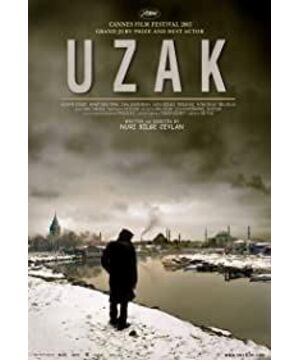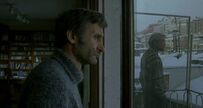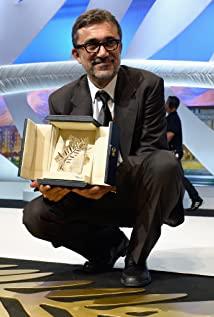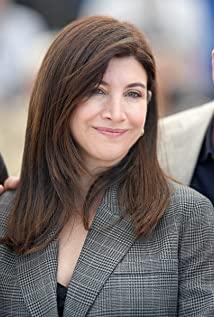Among the movies I watched recently, the most impressive are the three films of Turkish director Nuri Big Ceylon-"The Far Place", "The Weather Suitable for Breakup" and "The Three Monkeys". At first I went to the title of the best director in Cannes. After watching "Far Away", I realized that his excellent film narrative almost made me obsessed with it. Then I watched a series of other movies. Someone once said that Ceylon might become the next master of European cinema. I don't dare to draw too many conclusions after watching few movies, but from this evaluation, I can already feel his outstanding achievements in movies. He used film language to bring me to the time and space of Istanbul, Constantinople and Byzantium.
1. "Sorrow"
Some people say that Ceylon's movies and Pamuk's novels are representatives of the Turkish national culture and spirit. Indeed, it is easy for us to find the common characteristics of Pamuk's novels in Ceylon's movies—city, streets, and sorrow. In his novel, Pamuk recalled his childhood in Istanbul. He directly referred to the memory and sorrow hidden in the hearts of the Turks for the glory of the empire as "sorrowful". He said, "In the morning of midwinter, when the sun suddenly shines In the Bosphorus Sea, a slight mist rises from the surface, you can almost touch the deep "sorrow", and you can almost see it like a film covering the residents and landscape." In his eyes, Istanbul's "sorrow" is collective, sticky, within reach, and lingering. In the same way, in Ceylon movies, we can also feel the heavy sadness of Istanbul. Whether it's the two men with different identities and different minds in "The Far Place", or the couple who quarreled and separated in the heavy snow in "A Season Suitable for Breaking Up", or "The Three Monkeys" In the family of betrayal, concealment, entanglement, anger, and pain, there is no laughter or even hope in Ceylon's movies. Some are just heavy and sad that cannot be removed.
Like Pamuk’s graceful and lyrical slow narration, the melancholic narration in Ceylon films is not through violent carnival and catharsis, nor is it the outline of rough times and backgrounds, but through the most subtle between people. The relationship is completed through entanglements and struggles between family and ethics. "Three Monkeys" originally told a simple story. The father of the family put a politician in jail in order to get a sum of money, while the mother cheated during this period and fell in love with the politician. After my father returned home, the house began to be filled with quarrels, suspicions and tears. And the son who watched all this silently killed the politician after a long backlog and pain. With a simple storyline, Ceylon focused on the character and inner depiction. For example, when a mother meets a politician, the out-of-date and long-winded love pop song is a symbol and embodiment of the mother’s inner desires, while the father’s heavy breathing, angry expression and cursing, trembling appearance are full of With the meaning of patriarchy and patriarchy, the drowning children and horrified eyes that appeared twice in the film, as well as the faint group photo of four people, all hint at the painful past of our family. The dialogue between the father and the son once mentioned the "brother", and the two also went to the brother's grave. The "brother" is almost hidden in the narrative of the movie, and from the film's ambiguous narration, we may also know that the "brother" "It is the cloud covering the family, the painful and burning scars of the past. To a certain extent, the film is full of streams of consciousness, and sad emotions flow freely in the film. The long shots and slow rhythm portray the protagonist’s emotions vividly.
In "Three Monkeys", perhaps the mother’s betrayal is a kind of despair trapped in the web of eroticism, or the son’s crime and anger is one of his patriarchal “fascination”, and the two top crimes can also be regarded as the director’s confrontation. The mockery and criticism of the modern judicial system. But I think the background color of the whole film is still sadness, the kind of lingering sadness. I think that Ceylon has already engraved Pamuk's so-called "sorrow" into the bones of the whole movie, and the sunset-like sadness of the Turkish nation has penetrated into the bones of the bones. When I watched the last few scenes of the film, my father looked at the mother who was about to jump off the building with his eyes full of love and tenderness. He was originally angry and said softly: "Baby, come down", I suddenly realized that the director The content to be expressed has gone beyond the judgment of morality and the judgment of right and wrong. This is not a question of wife derailment or son's crime, because no matter whether the wife, the husband or the child, whether right or wrong, there is no way to escape the common ending. I think what Ceylon tells us is that reality and life have long been woven into a web that binds us together. Sadness and misfortune are our common destiny.
Second, the relics of the empire
The pervasive sadness in Ceylon movies comes from his familiar grasp of the city and his hometown. I have never been to Istanbul. My initial imagination came from a picture book. The book introduced Hagia Sophia in Istanbul with beautiful pictures and beautiful language, and wrote affectionately: It is an imperial relic. The place. Later, after reading history books, I learned that Istanbul had a glorious history whether it was the Roman Empire, the Byzantine Empire or the Ottoman Turk Empire. No wonder Pamuk has to be proud and feel that Istanbul does not put historical relics in museum collections like the West does. The people of Istanbul just continue their lives in the ruins.
When we watched Ceylon movies, I unconsciously wanted to look for the historical relics of modern urban civilization in the movie. Because for me, Turkish movies are not a piece of story and plot, but an experience and imagination of a foreign civilization.
At the beginning of "Distant", a cousin who was alone appeared in the small streets of Istanbul at dusk, surrounded by two rows of buildings, a sparse crowd, and from time to time a few women in national costumes passed by with a grudge. The surrounding water vapor and white mist made the whole atmosphere stained with ethereal and melancholy atmosphere. While in the "Distant" film, both cousin and cousin stared at the brightly lit Istanbul streets from the balcony several times. They frowned closely, their eyes seemed to be non-existent, and not far away, they could vaguely see the street. The central square and mosque. And in "A Climate Suitable for Breaking Up", let alone the Hagia Sophia in the snow, the dim street lights and corridors at night, and the Marmara Sea under dark clouds. In "Three Monkeys", the lonely houses on the seaside where the family lives are dilapidated and old, but they are so poetic. The sounds of seagulls and the rising and falling of the tide come from time to time, facing this. With the ebb and flow of the day, the story of joys and sorrows happened in an ordinary family like this. In Ceylon movies, even the buildings and houses, as well as the modern advanced vehicles and streets are stained with heavy sadness.
The tones in Ceylon movies are usually cold, and each long lens is a great photographic work. Presumably Ceylon is a photography-loving person, because the protagonists in his films seem to be proficient in photography, and they often linger in the monuments of Turkey. The protagonist of "Distant" is directly a photographer. He went to the countryside, mountains and mosques to take pictures. In "Climate Suitable for Breaking Up", the husband and wife took pictures in front of the ruins of the Turkish temple. When the two broke up, the husband I didn't forget to take photos while looking for his wife. There is no doubt that the tones and shots in Ceylon movies give the ancient buildings and streets of Istanbul a sad and sacred brilliance. His shots and pictures are poetic and heavy. I believe that Ceylon has deep love and even sympathy for the history of its own nation and country. In Turkey, the relics of the past have now been turned into ruins, and the people in them are facing various dilemmas of life under the ruins.
3. The West and the Modern
In the imperial elegy of Ceylon, we can easily find the shadow of modern civilization behind it. Ceylon is not immersed in the recollection of history and the past. On the contrary, Istanbul is a modern metropolis full of imperial relics in his films. The tall buildings rising from the ground and the bustling streets all pass in front of the old church. When night falls, crime, ugliness, affair, and violence are staged one after another. The people in the slums and the street vagrants are all open. Big eyes are waiting for food, money, or a possible offense.
In my opinion, the separation between cousin and cousin in "The Far Place" may be a symbol of the two opposites between tradition and modernity, rural and urban. The protagonist Mamu is a busy one in this city. He worked so hard in this city and finally got a place, he became a photographer, and his life was relatively rich. And his cousin, because of the economic recession and being fired from the factory, went to Istanbul to join him. The cousin looked for jobs several times to no avail, and in the long-term relationship between the two of them, they finally got a lot of grievances because of the differences in values and lifestyles. An invisible "wall" was gradually built between the two. My cousin hoped that his cousin could introduce him to work, and his cousin Mamu also had his own difficulties. He knew how difficult life is in a big city; his cousin came from In the countryside, he is dirty, undressed, unruly, and unruly, but he is simple, free, and full of desires and pursuits for women and eroticism. Although his cousin Mamu was also born in the countryside, his years of urban life have turned him into An out-and-out urbanite, he pays attention to rules, loves cleanliness and tidiness, he understands the world, and he pays attention to his identity. The difference in the values and behaviors of the two people is often expressed in the film. For example, the use of the flush toilet. Since the first day when the cousin arrived home, the cousin asked him not to use the flush toilet. In the long-term relationship, the cousin not only He didn’t follow his cousin’s suggestion but messed up the whole house. His cousin was very angry about this. His cousin held a more arrogant and indifferent attitude towards his cousin. He sneered at the sailor smoke sent by his cousin. Everyone condemned the behavior of the cousin, and wrongly suspected that the cousin stole the watch and caused the cousin to leave; and the cousin was cautious and observant of his cousin. The cousin felt depressed and helpless at his cousin’s house. He came to join his cousin because the factory was bankrupt and desperate. His family was poor and he didn't even have money to treat his mother. He very humblely hoped that his cousin could introduce him to a job, and it was tricky to make phone calls at night.
The cousin comes from a remote and poor countryside, and the cousin comes from a big city with a magnificent experience. The difference between the two people is to some extent the difference between the city and the countryside, the modernity and the tradition, the West and the East, and the difference between civilization and backwardness. Human conflict is also a conflict between old and new things. It can be said that Ceylon's movies well convey the current state of contradictions and conflicts in Turkish society facing the impact of Western civilization.
You can also see from the film that despite the many differences, the cousin and the cousin have their own concerns, but they both endure the same suffering and misfortune. The cousin’s life is embarrassing and financially difficult, and he doesn’t even have the money to treat his mother; what about the cousin? He was even more lonely in the big city. His wife divorced him when he was three months pregnant, and his mother was sick, and his sister and other family members had their own lives, so he couldn't comfort him at all. On the night when the lights were first in Istanbul, the rural cousin and the urban cousin licked their wounds, quietly savoring loneliness. They both tried to conceal their frustration in front of each other, but they did not expect that despite the big differences and gaps between the two sides, they both endured the hardships and inner pains of life. The spiritual pain of modern civilization is clearly reflected in the movies. Ceylon's movies are full of pain, sighs, entanglements, and melancholy emotions that cannot be dissipated. In "Distant", whenever the camera switches to the modern and civilized buildings in Istanbul, the protagonist will always have frowned brows and a painful face. I think that in Ceylon's movies, to some extent, it expresses the helpless Turks under a civilization.
Pamuk once said: "I know that at least at night, Western eyes cannot see us, and outsiders cannot see the shameful poverty in our city. It is a relief." Pamuk said more or less. It expresses the West in the eyes of the Turks. The western way at night cannot see the terrible poverty in the city. Turkey seems to like to hide their secrets in the dark. In the past, Turkey or Eastern civilization always hid when facing the West, but in the movies of Ceylon, he raised his head so proudly, and expressed so frankly in the movies. After the development of civilization, he fell completely. How did the historically turbulent Turkey struggle with contradictions, anxiety and melancholy. He used images to express Turkey under the influence of the West. Instead of being flattery with civilization, he conveyed the unique national characteristics of Turkey. In his films, Istanbul is full of traces of the past, and ancient history is deposited in these, and has gone through wind and frost and turned into pale mosques. History has left "sorrowful" sorrows and memories in people's hearts. However, Istanbul is so full of modern hustle and bustle.
After watching three movies, I am about to finish writing this shallow thought. Istanbul under the lens of Ceylon has been lingering in my mind for a long time, and when I opened Pamuk’s novels again, the memories of the ancient neighborhoods became three-dimensional again. Through literature and movies, I experienced an Istanbul experience. trip. This city on the Bosphorus Strait is full of sadness, both in the past and in the present. With the eyes of modern civilization, we looked at her face that has experienced weather and frost, and finally realized that there is a kind of beauty born out of vicissitudes of life.
View more about Distant reviews









